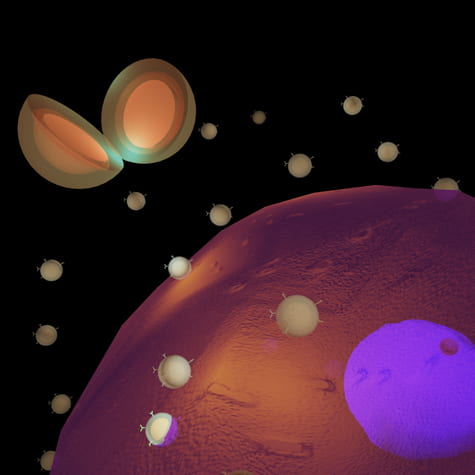Washington University CMMN is one of six Centers of Cancer Nanotechnology Excellence supported by the National Cancer Institute
The primary goal of CMMN is to provide novel nanotherapeutic approaches to eradicate multiple myeloma
The Washington University Center for Multiple Myeloma Nanotherapy (CMMN) is one of six Centers of Cancer Nanotechnology Excellence (https://nano.cancer.gov/action/programs/washup3/) supported by the National Cancer Institute (NCI). The CMMN will address overarching questions in bone malignancies, with a focus on multiple myeloma (MM). MM is a hematopoietic malignancy caused by terminally differentiated malignant plasma B-cells. Myeloma cells simultaneously activate the bone-resorbing osteoclast cells in the bone marrow and inhibit bone-forming osteoblast cells, culminating in a vicious cycle of tumor growth and bone destruction. A grim result of this interplay is that 80% of MM patients present bone lesions including pathologic fracture at diagnosis. Additionally, the side effects of chemotherapeutics can result in an increased risk of systemic toxicity and hospitalization costs. An impaired bone marrow reserve imposes additional constraints on how best to deliver therapy without further increasing the risk for complications. About 10% of patients have primary refractory disease and fail to respond to induction treatments. Thus, although newer molecular therapeutics may extend patient survival, nearly all patients will eventually relapse and die from MM.
The primary goal of the CMMN is to provide novel nanotherapeutic approaches that eradicate MM and prevent frequent relapse without compromising the quality of life. The program will accomplish these goals by developing novel nanotherapeutics that utilize unique drug delivery mechanism and multidimensional treatment paradigms.
Anchored by 3 projects and two cores, the CMMN will (1) develop integrated curative approach for the treatment of MM with minimal off-target toxicity; (2) identify nanotherapeutics for clinical translation; (3) provide a platform to educate, train, and mentor young investigators and students on techniques and methods of cancer nanomedicine; (4) create environment for productive outreach programs that brings researchers and patients together through workshops and seminars; and (5) collaborate with other NCI’s Alliance for Nanotechnology in Cancer and non-member investigators to share information and resources with a goal to accelerating clinical translation of nanomedicine to human patients.”

Beyond MM, successful completion of the proposed research will advance the treatment of hematological diseases in general and usher new therapies for tackling the challenges in treating bone marrow metastasis.